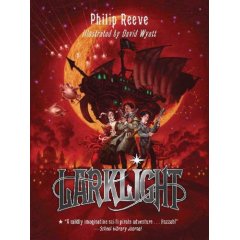
New Moon
by Stephenie Meyer
Megan Tingley Books (Little, Brown and Company), New York, 2006. 563 pages.
Starred Review.
Oh, these books are so bad to read if you’re planning to get any sleep! I was good the first night, and stopped after about a hundred pages. But the second night, I kept reading and reading, and by the time I’d finished the book, it was not so early in the morning. And I had to go to work, too! Yikes!
Stephenie Meyer is good with feelings. Mind you, she’s got a nice complicated situation — Bella’s in love with a vampire who has an especially powerful thirst for her blood, but resists that urge because he loves her. In New Moon, Edward faces the “reality” that he is not good for Bella, and Bella is not good for him. So he leaves her.
Stephenie Meyer captures well how it feels to be left by the love of your life. The unbelievable shock of seeing hard coldness on his face when he says he’s leaving. The utter numbness that follows, wondering how to go on, how to face ordinary, day-to-day life.
I wouldn’t give this to a teenager going through a rough break up! For that matter, it’s a bit hard on a woman in her 40’s going through a divorce! But the author does capture the emotions involved, and you do feel with Bella and understand her.
Bella does find a friend who can help her escape her numbness and face life again. His feelings for Bella are going beyond friendship, but he means a lot to her, so maybe that’s okay? Now, there’s an added complication: Back in the first book he’s the one who told Bella about legends of vampires, along with the legend that his tribe had a way of dealing with them, that his tribe and vampires are mortal enemies, who had worked out a temporary truce.
Bella’s not good at “moving on,” but how do you “move on” from the love of your life?
This passage gives you the feel of what Bella has to deal with in New Moon:
I thought about Juliet some more.
I wondered what she would have done if Romeo had left her, not because he was banished, but because he lost interest? What if Rosalind had given him the time of day, and he’d changed his mind? What if, instead of marrying Juliet, he’d just disappeared?
I thought I knew how Juliet would feel.
She wouldn’t go back to her old life, not really. She wouldn’t ever have moved on, I was sure of that. Even if she’d lived until she was old and gray, every time she closed her eyes, it would have been Romeo’s face she saw behind her lids. She would have accepted that, eventually.
I wondered if she would have married Paris in the end, just to please her parents, to keep the peace. No, probably not, I decided. But then, the story didn’t say much about Paris. He was just a stick figure — a placeholder, a threat, a deadline to force her hand.
What if there were more to Paris?
What if Paris had been Juliet’s friend? Her very best friend? What if he was the only one she could confide in about the whole devastating thing with Romeo? The one person who really understood her and made her feel halfway human again? What if he was patient and kind? What if he took care of her? What if Juliet knew she couldn’t survive without him? What if he really loved her, and wanted her to be happy?
And . . . what if she loved Paris? Not like Romeo. Nothing like that, of course. But enough that she wanted him to be happy, too? . . .
If Romeo was really gone, never coming back, would it have mattered whether or not Juliet had taken Paris up on his offer? Maybe she should have tried to settle into the leftover scraps of life that were left behind. Maybe that would have been as close to happiness as she could get.
I sighed, and then groaned when the sigh scraped my throat. I was reading too much into the story. Romeo wouldn’t change his mind. That’s why people still remembered his name, always twined with hers: Romeo and Juliet. That’s why it was a good story. “Juliet gets dumped and ends up with Paris” would have never been a hit.
Buy from Amazon.com
Find this review on the main site at:
www.sonderbooks.com/Teens/new_moon.html









